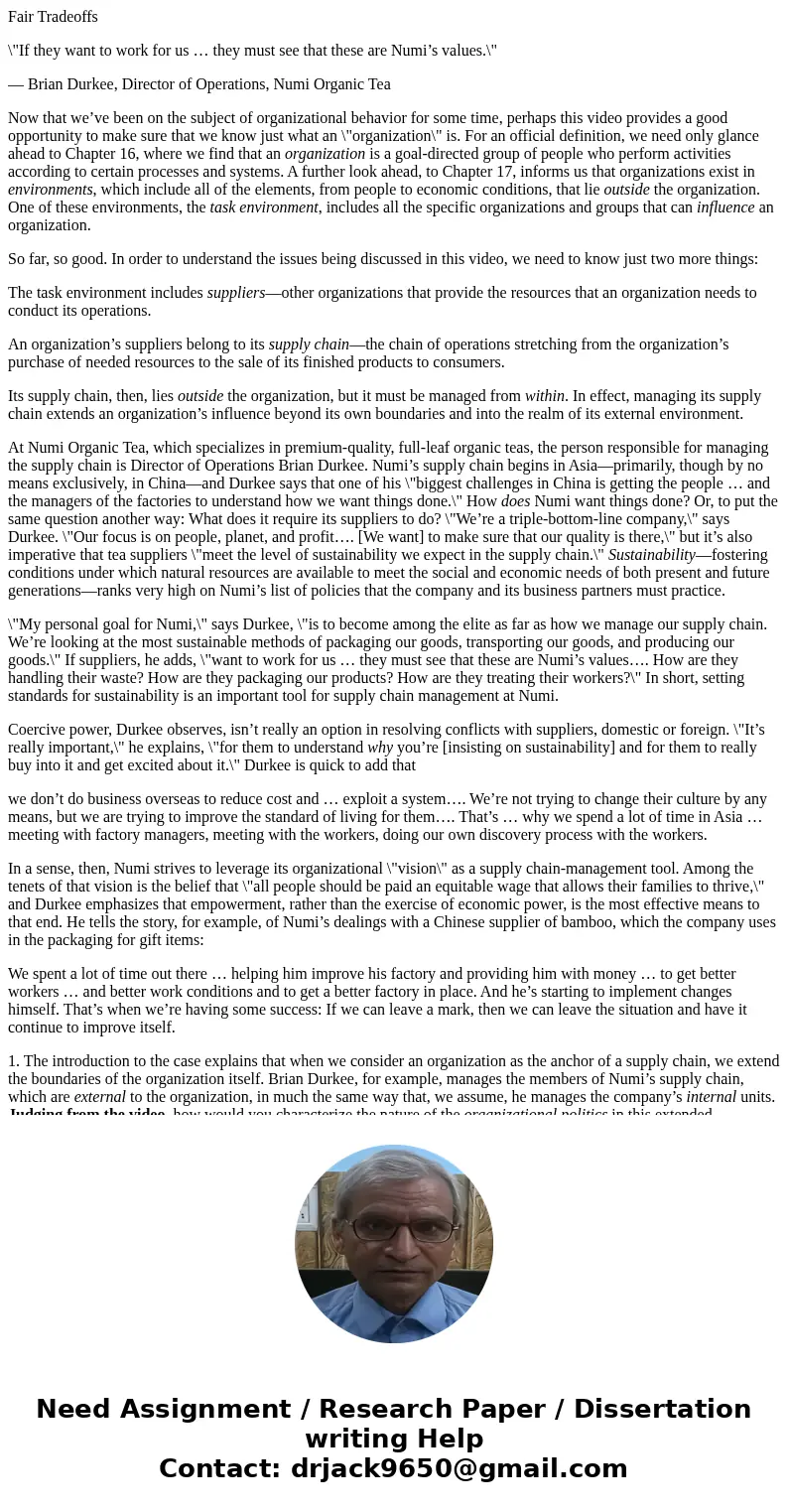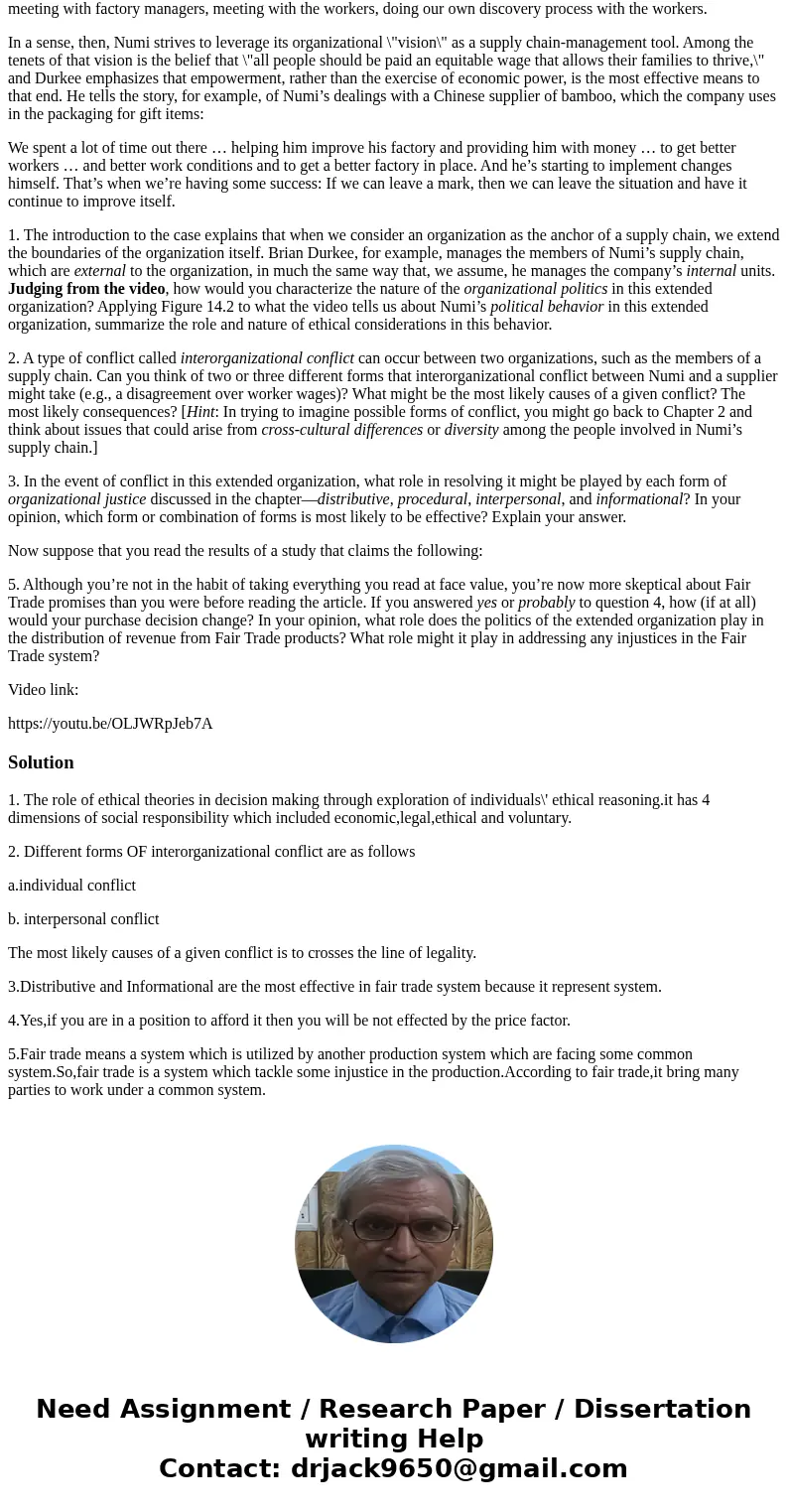Fair Tradeoffs If they want to work for us they must see th
Fair Tradeoffs
\"If they want to work for us … they must see that these are Numi’s values.\"
— Brian Durkee, Director of Operations, Numi Organic Tea
Now that we’ve been on the subject of organizational behavior for some time, perhaps this video provides a good opportunity to make sure that we know just what an \"organization\" is. For an official definition, we need only glance ahead to Chapter 16, where we find that an organization is a goal-directed group of people who perform activities according to certain processes and systems. A further look ahead, to Chapter 17, informs us that organizations exist in environments, which include all of the elements, from people to economic conditions, that lie outside the organization. One of these environments, the task environment, includes all the specific organizations and groups that can influence an organization.
So far, so good. In order to understand the issues being discussed in this video, we need to know just two more things:
The task environment includes suppliers—other organizations that provide the resources that an organization needs to conduct its operations.
An organization’s suppliers belong to its supply chain—the chain of operations stretching from the organization’s purchase of needed resources to the sale of its finished products to consumers.
Its supply chain, then, lies outside the organization, but it must be managed from within. In effect, managing its supply chain extends an organization’s influence beyond its own boundaries and into the realm of its external environment.
At Numi Organic Tea, which specializes in premium-quality, full-leaf organic teas, the person responsible for managing the supply chain is Director of Operations Brian Durkee. Numi’s supply chain begins in Asia—primarily, though by no means exclusively, in China—and Durkee says that one of his \"biggest challenges in China is getting the people … and the managers of the factories to understand how we want things done.\" How does Numi want things done? Or, to put the same question another way: What does it require its suppliers to do? \"We’re a triple-bottom-line company,\" says Durkee. \"Our focus is on people, planet, and profit…. [We want] to make sure that our quality is there,\" but it’s also imperative that tea suppliers \"meet the level of sustainability we expect in the supply chain.\" Sustainability—fostering conditions under which natural resources are available to meet the social and economic needs of both present and future generations—ranks very high on Numi’s list of policies that the company and its business partners must practice.
\"My personal goal for Numi,\" says Durkee, \"is to become among the elite as far as how we manage our supply chain. We’re looking at the most sustainable methods of packaging our goods, transporting our goods, and producing our goods.\" If suppliers, he adds, \"want to work for us … they must see that these are Numi’s values…. How are they handling their waste? How are they packaging our products? How are they treating their workers?\" In short, setting standards for sustainability is an important tool for supply chain management at Numi.
Coercive power, Durkee observes, isn’t really an option in resolving conflicts with suppliers, domestic or foreign. \"It’s really important,\" he explains, \"for them to understand why you’re [insisting on sustainability] and for them to really buy into it and get excited about it.\" Durkee is quick to add that
we don’t do business overseas to reduce cost and … exploit a system…. We’re not trying to change their culture by any means, but we are trying to improve the standard of living for them…. That’s … why we spend a lot of time in Asia … meeting with factory managers, meeting with the workers, doing our own discovery process with the workers.
In a sense, then, Numi strives to leverage its organizational \"vision\" as a supply chain-management tool. Among the tenets of that vision is the belief that \"all people should be paid an equitable wage that allows their families to thrive,\" and Durkee emphasizes that empowerment, rather than the exercise of economic power, is the most effective means to that end. He tells the story, for example, of Numi’s dealings with a Chinese supplier of bamboo, which the company uses in the packaging for gift items:
We spent a lot of time out there … helping him improve his factory and providing him with money … to get better workers … and better work conditions and to get a better factory in place. And he’s starting to implement changes himself. That’s when we’re having some success: If we can leave a mark, then we can leave the situation and have it continue to improve itself.
1. The introduction to the case explains that when we consider an organization as the anchor of a supply chain, we extend the boundaries of the organization itself. Brian Durkee, for example, manages the members of Numi’s supply chain, which are external to the organization, in much the same way that, we assume, he manages the company’s internal units. Judging from the video, how would you characterize the nature of the organizational politics in this extended organization? Applying Figure 14.2 to what the video tells us about Numi’s political behavior in this extended organization, summarize the role and nature of ethical considerations in this behavior.
2. A type of conflict called interorganizational conflict can occur between two organizations, such as the members of a supply chain. Can you think of two or three different forms that interorganizational conflict between Numi and a supplier might take (e.g., a disagreement over worker wages)? What might be the most likely causes of a given conflict? The most likely consequences? [Hint: In trying to imagine possible forms of conflict, you might go back to Chapter 2 and think about issues that could arise from cross-cultural differences or diversity among the people involved in Numi’s supply chain.]
3. In the event of conflict in this extended organization, what role in resolving it might be played by each form of organizational justice discussed in the chapter—distributive, procedural, interpersonal, and informational? In your opinion, which form or combination of forms is most likely to be effective? Explain your answer.
Now suppose that you read the results of a study that claims the following:
5. Although you’re not in the habit of taking everything you read at face value, you’re now more skeptical about Fair Trade promises than you were before reading the article. If you answered yes or probably to question 4, how (if at all) would your purchase decision change? In your opinion, what role does the politics of the extended organization play in the distribution of revenue from Fair Trade products? What role might it play in addressing any injustices in the Fair Trade system?
Video link:
https://youtu.be/OLJWRpJeb7A
Solution
1. The role of ethical theories in decision making through exploration of individuals\' ethical reasoning.it has 4 dimensions of social responsibility which included economic,legal,ethical and voluntary.
2. Different forms OF interorganizational conflict are as follows
a.individual conflict
b. interpersonal conflict
The most likely causes of a given conflict is to crosses the line of legality.
3.Distributive and Informational are the most effective in fair trade system because it represent system.
4.Yes,if you are in a position to afford it then you will be not effected by the price factor.
5.Fair trade means a system which is utilized by another production system which are facing some common system.So,fair trade is a system which tackle some injustice in the production.According to fair trade,it bring many parties to work under a common system.


 Homework Sourse
Homework Sourse